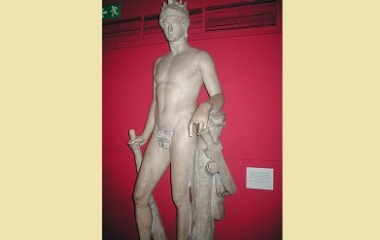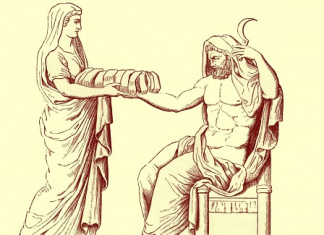- Pronunciation: THEE-see-us
- Origin: Greek
- Role: Hero
- Town: Athens
- Mother: Aethra
- Symbols: Sandals and Sword
Who Is Theseus?
Theseus was a well-respected Greek hero. He was strong, courageous, and very wise. He worked hard to protect Athens and helped develop their power structure. He led the Athenian army on a number of battles, always returning victorious. He was known for helping the poor and less fortunate and also founded modern-day democracy.
Purpose
Theseus became a voice of reasoning for the people. A popular Athenian saying, “Not without Theseus,” shows how he was respected by the people and not just for his bravery or strength, but also for his wisdom and ability to conquer any situation.
Legends and Stories
The myth of Theseus is long and detailed. It tells of his childhood, his travels to Athens, the discovery of his true father, and how he saved countless lives with his services.
The Travel to Athens
Theseus was born in Troezen. His mother, Aethra, was unsure of who his father was. King Aegeus was a possibility, and told Aethra that when the child became of age, he was to lift a rock and take the sword and sandals hidden beneath. After hiding the items, Aegeus headed back to Athens.
When Theseus was a young man, his mother took him to the rock. He was able to lift it easily. He took the sword and sandals and threw the large rock into the forest. Realizing that the King was his father, Aethra told Theseus he must go to Athens, where he would become heir to the throne.
It was common knowledge that the best way to travel was by boat, due to the high number of criminals who had overtaken the roads. But Theseus was brave and excited to test his strengths during his travels.
He soon came across his first challenge. In the road in front of him stood a man with a club. His name was Periphetes, who told Theseus that he was going to use the club to crush his head. Theseus retaliated, saying that he didn’t think the club was made of brass like Periphetes claimed. The men argued and Periphetes became aggravated. He gave the club to Theseus to prove that it was indeed made of brass. Once he had it in his hands, Theseus hit Periphetes with it, took the club, and went on his way.
A few miles later, Theseus came across a man with an axe. His name was Sciron, who told the young hero that he would chop of his head and feed him to his turtle at the bottom of the nearby cliffs unless Theseus washed Sciron’s feet. Theseus obliged, but when Sciron wasn’t looking, Theseus grabbed him by the feet and threw him over the cliff to be eaten by the turtle.
He them came across a man who asked him to hold down a pine tree. Theseus did, and the man was surprised that he was able to hold it down instead of being flung in the air. He bent down to examine Theseus’ grip, and when he did, Theseus let go and the tree knocked the man unconscious. He then tied his legs to one tree and his arms to another, letting the trees rip the man in half.
Theseus last test was at an inn, where he needed a bed. He had heard of the man who owned the inn though. He would either stretch his guests or remove their legs to make them fit in the beds. When Theseus was being shown the bed, he threw the man down, cut of his legs, and then his head. He rested after his long day and prepared to enter Athens in the morning.
Theseus and Aegeus
Theseus arrived in Athens. He went to the castle to meet the King, who had married a sorceress named Media. Media knew that Theseus was the son of the King and feared he would try to get rid of her. She told Aegeus that the hero had come to kill him. To prevent this, she would give the young man poisoned wine at dinner that evening.
Just as Theseus was about to take a sip of the doomed wine, Aegeus recognized his sandals and sword. He knew that Theseus was his son and shoved the wine glass to the floor. Medea left the castle and Theseus and his father spent every day together.
Theseus’ True Test of Bravery
A ship with a black sail approached Athens. Theseus asked what it meant and learned that Androgeus, the son of King Minos of Crete, was accidently killed in Athens many years before. As payment for their sin, Athens was to send seven males and seven females each year to be sacrificed in Crete. They were fed to the Minotaur, a half man and half bull monster.
Theseus volunteered himself to go and fight the monster. At first, Aegeus refused but he eventually agreed to let his son go under one condition. Once he boarded the ship to return, he was to change the ship’s black sails to white.
Theseus arrived in Crete. The King welcomed them and asked their names. Theseus said he was the son of Poseidon, disguising his identity as the Prince of Athens. King Minos sent Theseus into the sea to fetch a ring as a test. Theseus dove in after praying to Poseidon for help. A nymph gave him the ring, which he returned to shore with.
The King’s daughter, Ariadne, approached Theseus and told him she wanted the Minotaur dead. She also wanted Theseus to take her to Athens when it was all over. Theseus agreed and went to sleep to prepare for his battle.
The next morning, Theseus approached the monster with the others who were to be sacrificed. He jumped on the Minotaur’s back, ripped out a horn, and began to poke the monster. He then ran quickly away and threw the horn into the monster’s neck. The Minotaur screamed out and then fell over. Theseus had defeated the monster.
Theseus, Ariadne, and the rest of the saved individuals boarded the ship and began their return. But the god Dionysus appeared and claimed Ariadne for his own. Theseus did not fight the god but was so drowned in despair that he forgot to change the sails to white. As Aegeus saw the ship approach, he saw the black sails and, assuming his son had died, jumped into the sea. As a tribute to the late King, the waters were named the Aegean.
Appearance
In artistic representations, Theseus is shown as a handsome young man, usually armed with a sword, and looking seemingly prepared for any situation.
Symbology
The two main symbols associated with Theseus are his sword and sandals.










